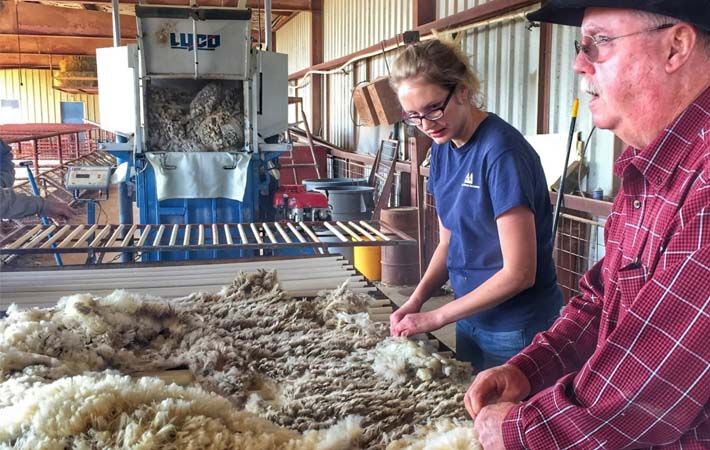Texas A&M wool lab in US ready with new capacities & equipment

The newly expanded laboratory will utilise state-of-the-art machinery and technology in its service to American wool and mohair producers. It will also continue to provide innovative research and testing services for cashmere and alpaca fibres. Although the lab is in full swing with renovations as new high-capacity commercial testing equipment arrives, individual fleece-testing services continue to be offered to growers.
The lab was established in 1985 to address the needs of national wool and mohair research programmes. The wool lab, originally located on the Texas A&M campus, is now in a region of Texas that supports approximately 20 per cent of the US sheep population and 90 per cent of the Angora goats in the nation.
Scientists at the wool lab conduct key high-priority research projects for sheep and goat raisers throughout the country. Research on objective measurement of fibre, for example, has been critical in developing improved flocks of fine-wool producing sheep, as well as ensuring domestic wool meets the required international testing specifications for commercial trade.
Improvements in Angora goats and mohair have also long been a focus. As a result, Texas remains not only the largest wool producer in the US but also the largest mohair producer, showcasing some of the best Angora goat genetics in the world.
Housed at the Texas A&M AgriLife Research and Extension Centre in San Angelo, the lab offers a nationwide service analysing fibre samples for quality and yield. San Angelo is one of only two research laboratories that provide those services in the US and the only one to offer — as a result of its current expansion — large-scale commercial testing required for the global trade of wool.
“We provide timely and meaningful information to producers about their animal’s fibre, based on their samples we analyse,” said Ronald Pope, Texas A&M AgriLife Research animal fibre scientist, San Angelo.
Pope explained knowing which animals produce the best fibre is crucial in improving breeding programmes and producers’ bottom lines. The lab can analyse fibre diameter, length and yield.
Before the Bill Sims Wool Lab was established in 1985, there was a research lab and a wool-processing plant at Texas A&M University in College Station that originated between 1919 and 1921, said Dawn Brown, Bill Sims Wool Lab manager, San Angelo. Much of the early work done there helped to shape the genetic selection of the modern-day Rambouillet sheep.
The Rambouillet is the predominant fine-wool sheep breed found in Texas. Its range-hardy nature has also led it to be found in great numbers across many large western wool-producing states. It is also sometimes referred to as the French cousin of the well-known Spanish Merino sheep breed.
“If you look at old pictures of Rambouillet, how they look now is worlds apart from how the breed looked back then,” Brown said. “Texas A&M AgriLife has been instrumental in influencing the genetic and progeny selection that produce the profitable characteristics we see today in Rambouillet flocks across the US.”
Over the last 105 years, Texas A&M AgriLife scientists have produced volumes of research reports and findings that had far-reaching effects throughout the fibre industry.
From resistance-to-compression studies that showed American wool was suitable to produce the finest fabrics to address market concerns, the research done through Texas A&M has helped shape the US wool industry for well over 100 years as well as influence global markets.
The contributions the Bill Sims Wool Lab and its precursors have made to the industry even just over the last 50 years have been remarkable, Brown said. Utilising the latest technology and equipment, the wool lab helps lead advancements in academic and scientific sheep-related studies and puts those innovations into use to serve the commercial industry.
The research conducted at the wool lab has increased the use of pre-sale objective measurements for raw wool and mohair transactions, resulting in value-based marketing systems and more equitable prices for producers. The wool lab has also been key in the widespread use by American wool producers of skirting and classing as value-adding practices prior to the sale of raw material.
The wool lab, Texas A&M AgriLife Extension Service specialists and AgriLife Research scientists have also been involved in collaborative studies of several new breeds and crossbreeds of sheep conducted in western Texas and nationally. They are also responsible for shaping much of the current knowledge on the effects of North American environments on fibre production by sheep.
Brown and Pope will speak on the history and future of the wool lab on August 20 as part of the 48th Annual Sheep and Goat Field Day.
“The field day provides an opportunity for producers and the public to come to the San Angelo centre and get to see the wool lab facility first-hand and gain a better understanding of what we do and how we do it,” Brown said. “Not only will we be discussing the rich history of the wool lab, but our ongoing projects and the exciting future we envision.”
“Natural fibres from sheep and goats are at the forefront of the sustainable textile industry,” Pope said. “Combine that with the numerous benefits they bring to the land upon which they roam, and well, no other fibre can compete. It’s a great time to celebrate an industry that has strived over a century to develop improvements that ensure a productive and environmentally sound future.”
Fibre2Fashion News Desk (SV)
































-Ltd..jpg?tr=w-120,h-60,c-at_max,cm-pad_resize,bg-ffffff)





.jpg?tr=w-120,h-60,c-at_max,cm-pad_resize,bg-ffffff)
.jpg?tr=w-120,h-60,c-at_max,cm-pad_resize,bg-ffffff)






